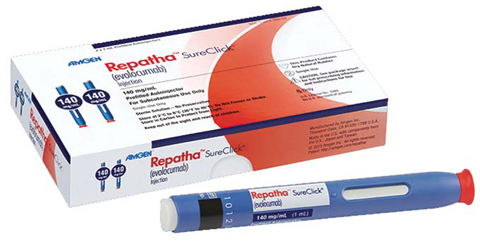 NEW YORK: This undated file image provided by Amgen Inc shows the cholesterollowering drug Repatha.
NEW YORK: This undated file image provided by Amgen Inc shows the cholesterollowering drug Repatha.WASHINGTON: When a powerful pair of cholesterol-lowering drugs first hit the market last summer, initial excitement in the medical community quickly turned to panic. The new drugs promised to reduce artery-clogging cholesterol by nearly twice as much as older ones. But they came at an eye-popping price: More than $14,000 per year, compared with roughly $150 for the standard drugs.
Some experts predicted a doomsday scenario in which the two injectable drugs, Repatha and Praluent, would add a staggering $100 billion to the US drug bill as doctors signed up millions of patients with elevated cholesterol. But then something unexpected happened: not much. Caught between skeptical doctors and cost-conscious insurers, the drugs have barely sold. Sanofi reported a meager $10 million from Praluent in the last quarter, which it co-markets with Regeneron Pharmaceuticals. Amgen Inc. declined to break out Repatha sales.
Spending on pricey specialty drugs has doubled over the last five years to $150 billion, contributing 70 percent of the growth in US medication spending since 2010, according to IMS Health. But the startlingly slow launch of Praluent and Repatha suggests insurers may have found their own formula for fighting back: proof-of-effectiveness requirements and rigorous paperwork that limits how many patients ultimately receive high-cost drugs. Experts see an escalating feud between drugmakers and insurers with little relief in sight.
Heart problems
“The companies think that their drug is going to save a lot of lives and payers tend to be skeptical of those claims - somewhere in the middle is the truth” says Professor Darius Lakdawalla of the University of Southern California. Generally speaking, insurers only cover the costs of the new drugs for patients with extremely-high cholesterol caused by genetic disorders, or those with a history of heart problems and elevated cholesterol.
The insurance paperwork can run several pages and often requires a detailed history of past treatments. Caught in the middle of the coverage fight are patients who say they desperately need more options to control bad cholesterol, or LDL. Christian Jacobs, 24, takes eight medications to manage his cholesterol and related complications, including blood thinners for the seven artery-opening stents he’s received since 2011.
He has a rare form of inheritable cholesterol that occurs in roughly one in a million people. So he was shocked when his insurance provider, UnitedHealth, rejected his doctors’ prescription for Repatha. “I was floored,” he said. “How in the world can we be rejected for a medication that I meet every single standard for?” Jacobs said UnitedHealth recommended he continue his current drug regimen to see if it lowers his cholesterol. He is appealing the decision.
UnitedHealth, which declined to comment on Jacobs’ situation due to patient privacy laws, said in a statement it uses “clinical guidelines and scientific evidence” when making coverage decisions. “These new therapies offer additional LDL cholesterol lowering and outcomes studies are still pending,” said the firm. — AP










